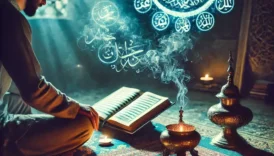What Is a Love Spell? Does It Really Work?
Love spells have historically been used to intensify emotional bonds or establish a special connection between hearts. In regions with a deep cultural heritage, such as Anatolia, countless examples are known of rituals that aim to win over a beloved person’s heart or strengthen existing affection. These practices may include prayers, amulets, symbolic objects, and spiritual focus. A frequently asked question is whether a love spell truly works. Some argue that the ritual channels intense emotional energy and can influence individuals’ attitudes, while others believe the effect is primarily based on personal faith and the power of suggestion.
- What Is a Love Spell? Does It Really Work?
- The Basic Approach of a Love Spell
- Types of Love Spells in Anatolia
- 1. Binding Spell
- 2. Affection Spell
- 3. Priest Spell (Papaz Büyüsü)
- The Role of Materials and the Transfer of Energy
- Performing the Ritual: Stages and an Example
- Remarks on Efficacy and Outcomes
- Points to Consider
- Final Word
- References
The Basic Approach of a Love Spell
Love is widely regarded as one of the most powerful emotions shaping the human spirit. In spell rituals, there is a belief that this emotion interacts with the energy channels of the universe and is molded by intention. In love spells designed to form a spiritual connection with a desired individual, various techniques have been developed to guide that energy properly.
- Purity of Intention: The sincerity of the purpose behind casting a spell is often deemed the most decisive factor in the ritual’s success. Many traditions state that the heart must be free of malice and any manipulative motive.
- Concentration and Mental Preparation: Before beginning the ritual, some opt for prayer, meditation, or purification rites to calm the mind and spirit.
- Symbolic Power of Objects: Love spells may use natural stones, candles, incense, or personal items belonging to the targeted individual. Each item’s role and symbolic meaning in facilitating energy transfer are considered significant.
Types of Love Spells in Anatolia
1. Binding Spell
A binding spell, known locally by various names, aims to strengthen the emotional ties between two people. Often, a personal belonging (such as a handkerchief or a lock of hair) from the loved one is used, and special prayers or formulas are recited at auspicious times. After the ritual, it is commonly believed that the amulet or charm must be kept secret.
2. Affection Spell
This practice focuses on enhancing feelings of love and compassion. It typically involves red candles or rose petals—symbols associated with passionate emotion. During the ritual, words and prayers expressing the hope that two hearts will become more harmonious are emphasized.
3. Priest Spell (Papaz Büyüsü)
The so-called “priest spell” likely emerged from cultural interaction and bears influences from multiple faiths. In some cases, phrases in other languages or interfaith talismanic formulas appear. In its love-centric usage, the main goal is to draw the beloved closer, intensifying emotional attraction.
The Role of Materials and the Transfer of Energy
Objects used in love spell practices serve as a symbolic link. Believers say that the emotion rooted in the heart can be transferred to these items and then projected into the universe.
- Candles: A red candle symbolizes passion or inner fire; sometimes pink or white candles are used together to underscore multiple facets of the intention—romance and purity, for example.
- Incense: Scents like rose, lavender, or jasmine are used to dispel negativity and calm the mind, allowing deeper focus.
- Natural Stones: Rose quartz, agate, or jade are thought to attract the energy of love. Holding them in hand is said to allow the feeling in the heart to resonate with the stone.
- Personal Objects: A photograph, a lock of hair, or other items intimately tied to the person’s energy serve as direct conduits for a magical link.
Performing the Ritual: Stages and an Example
- Preparation: The chosen period for the ritual (often nighttime or a specific moon phase) should be quiet and free from distractions.
- Purification: Cleansing the hands with water or using incense to create a spiritually clean environment is recommended.
- Arranging Materials: Candles, talismanic words, stones, or other objects are placed in an orderly manner. Clutter is avoided to maintain clarity of purpose.
- Prayers and Charms: Depending on one’s beliefs, selected verses, traditional formulas, or older texts are read to invoke affection and unity. The process often involves strongly visualizing the love energy building up.
- Transferring Energy: The chosen object (e.g., an amulet, a slip of paper with a formula, or a photograph) is breathed upon or spoken over, imbuing it with the intended feeling. Gazing at the candle’s flame while repeating these wishes strengthens the commitment.
- Closing and Safekeeping: Once the ritual is complete, the item in use is typically stored in a specific spot (like a drawer or beneath a pillow). In some traditions, burying a talisman in the ground or placing it in flowing water signals the ritual’s conclusion.
Remarks on Efficacy and Outcomes
Opinions vary widely regarding whether a love spell has tangible effects:
- A Spiritual Perspective: According to spiritual or esoteric viewpoints, the ritual interacts with universal energies to create a magnetic pull between hearts. The strength of this pull may hinge on one’s focus and depth of belief.
- Psychological View: Some argue that a love spell essentially functions as affirmation or positive visualization. These can boost an individual’s confidence and lead to more constructive behaviors, thereby making them more appealing to the target of their affection.
- Religious and Ethical Dimensions: Certain religious beliefs find spellwork objectionable, interpreting it as an attempt to manipulate another’s free will. Many traditions emphasize that love should arise willingly, and caution against forcibly altering someone’s feelings.
Points to Consider
- Purity of Intention: Spellwork geared strictly toward mutual affection, free from manipulative motives, is deemed more ethically acceptable in many practices.
- Moral Responsibility: Efforts to break up existing relationships or control another person’s free will are often considered morally problematic and believed to attract negative spiritual repercussions.
- Faith and Determination: The outcome of a spell can depend significantly on the practitioner’s level of belief, as well as their subsequent actions.
- Beware of Exploitation: High monetary demands for spell services can be a sign of fraudulent activity. Many caution against unscrupulous individuals exploiting people’s vulnerability in love-related issues.
Final Word
For centuries, love spells have been part of the cultural fabric in Anatolia, as well as in distant lands and varied belief systems. Some interpret these rituals as passionate emotional calls, others view them as psychological tools of suggestion. Regardless of perspective, many emphasize that genuine happiness grows from honest communication, shared respect, and the natural course of mutual affection. Rituals may serve as a symbolic pathway to express warmth within one’s heart, but true love is often nurtured by sincere emotion and the willingness of both parties.
References
- Magic and Sorcery in Folk Traditions, Anadolu Publications, 2010
- Love and Bonding in the Turkish Belief System, Cultural Bridges Journal, 2012
- Sufism and Spiritual Practices, Deep Knowledge Publishing, 2008
- Amulets and Ancient Anatolian Magic Traditions, Old Homeland Press, 2005
- Healing Herbs and Rituals, Journal of Traditional Medicine Studies, 2011





